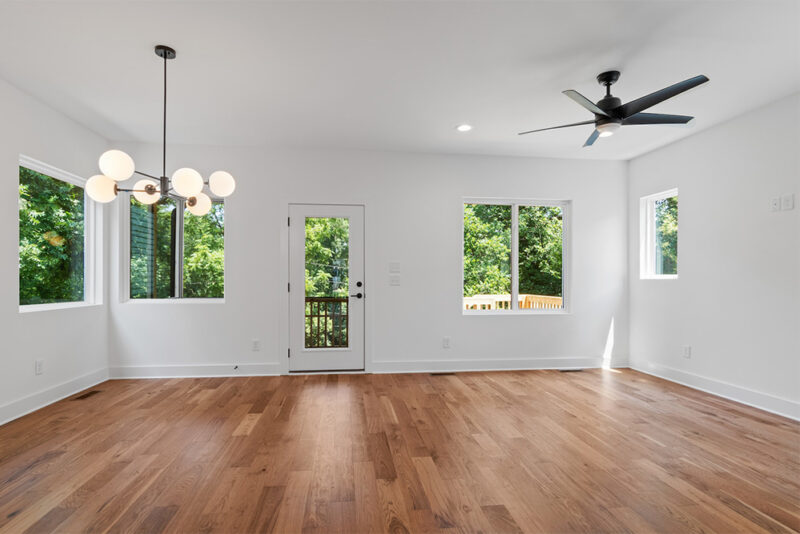Article Excerpt
Fixtures are permanent parts of a home. But what counts as permanent, and are fixtures included in a home sale? How can it affect your mortgage?
When viewing a home for sale, you might wonder which items in the home come with the house, and which ones will go with the seller when they move out once and for all. Some items, known as “fixtures,” must be part of a sale unless the buyer and the seller specifically agree otherwise.
Most fixtures are easy to identify because they are attached to the structure itself. Occasionally, the status of an item like a refrigerator, ceiling fan, or hot tub can be unclear. Sellers need to be clear about what is and isn’t a fixture if they believe there is any doubt. Buyers can ask sellers about specific items, even if it seems obvious that something meets the definition of a fixture.
Disputes over whether something is a fixture can affect a buyer’s loan process, delay closing, and even affect property taxes.

Photo by Curtis Adams on Pexels
What is a home fixture?
Two kinds of property are involved in real estate transactions in Texas:
Real property: The land itself and structures that are permanently affixed to the land are considered real property. Home fixtures are a type of real property.
Personal property: Tangible items that can be moved from one place to another, including appliances, furniture, electronic equipment, and fixtures like sinks and toilets.
When “personal property” is permanently attached to “real property”, it can become part of the real property. “Permanently attached” means that you cannot remove the item without damaging it or the home.
Examples of Home Fixtures
Spools of copper wire are personal property when you buy them at a hardware store. Once you install the wire in the walls as part of the electrical system, though, it becomes part of the home. It is a fixture because you cannot remove it without damaging both the home and the wire. Other items that are typically permanently attached to a home include:
Sinks, toilets, and other bathroom utilities
Plumbing pipes and equipment
Central A/C units
Ceiling fans
Built-in shelves
Alarm and security systems
Mailboxes
Shrubbery and other landscaping
Window treatments like blinds which are affixed to the wall
Hard-wired smart devices such as thermostats, cameras, doorbells, and more
Some items that are usually personal property can become fixtures if they are attached to the structure of the home. A refrigerator remains personal property as long as the only thing you need to do to remove it from the home is to unplug it and roll it out the door. If the refrigerator is enclosed in a custom-built cabinet, however, it is a fixture that belongs to the home. The same goes for a grill that is standing on its own on a patio versus one that is built into the masonry.
![Photo by leyla.a on Flickr [Creative Commons] outdoor kitchen with blue and white tile backsplash](/images/articles/_generalPhotoStandard/outdoor-kitchen.jpg)
Photo by leyla.a on Flickr [Creative Commons]
Determining Whether Something is a Permanent Home Fixture
The Supreme Court of Texas has identified three factors that can help determine whether a particular item is a fixture or not:
Whether the method used to attach the item to the home is typically permanent, such as cement, glue, or bolts;
Whether the item has been adapted to fit a particular purpose in the home, such as a pool cover cut to fit the exact size and shape of the home’s in-ground pool; and
Whether the homeowner intended to make the item a permanent part of the structure.
This three-part test only becomes relevant when the disagreement between a buyer and a seller has reached the point where they need a judge or jury to decide for them. The Texas Real Estate Commission (TREC) has made the determination fairly easy for most situations.
Paragraph 2B of TREC’s standard One to Four Family Residential Contract lists items that are usually considered to be fixtures. It concludes the list with “all other property attached to the above described real property.” If the home contains items described in paragraph 2B that the seller does not want to include in the sale, they need to list those items in paragraph 2D. The buyer must agree to exclude those items from the sale. The sales price may end up reflecting the cost of replacing those items or repairing the damage caused by removing them.
Are fixtures included in a home sale?
Once the sale of a home has closed, everything on the property (including its fixtures) belongs to the buyer unless the closing paperwork specifically states otherwise. If the seller left something there that they plan to retain ownership of, they should let the buyer know right away.
However, it is possible for a seller to keep ownership of a fixture without removing it from the property. The buyer must agree to this in a written addendum to the sales contract known as a “fixture lease.” For example, a seller might eventually want to recover solar panels attached to the home. They can lease them to the buyer until they are ready to have them removed or the buyer purchases them.
Determining what happens with fixtures during a sale is one of many big reasons you’ll want the help of an experienced real estate agent.

Photo by Max Rahubovskiy on Pexels
How do fixtures affect the mortgage lending process?
Fixtures play a role in the mortgage lending process. They are also important in the assessment of property taxes.
Home Appraisals
Mortgage lenders require a current appraisal in order to determine the loan-to-value ratio. Fixtures are a factor in determining a property’s value. Home appraisers will not, however, consider personal property that a seller will be removing from the home. If a seller intends to keep anything that otherwise looks like a fixture, the appraiser needs to know.
» READ MORE: The Home Appraisal Process: What You Need to Know
Some government-backed mortgage loan programs, including FHA and VA loans, require homes to be in liveable condition. The appraisal must investigate any deficiencies that would affect the home’s fitness to serve as a residence. This may include fixtures like plumbing, electrical wiring, and appliances.
» READ MORE: Differences Between Conventional, FHA, VA, & USDA Appraisals
Tax Appraisals
Texas handles property tax at the county level. Each year, county tax authorities send out tax appraisals to property owners. Real property is subject to property tax. Personal property, however, is exempt as long as it is not used to produce income. State law makes sure that fixtures included in the appraised value of real property are not also included in personal property appraisals.
Ready to purchase a home?
The process of buying a home can appear overly complex and intimidating. You are trying to buy a plot of land along with building(s), a plumbing system, electrical infrastructure, and more.
Mortgage financing makes it all possible, but might add to feelings of being overwhelmed. You don’t have to go through all of this on your own. Help is available from the mortgage professionals at the Wood Group of Fairway. We’ll answer your questions and help you understand your options. Get started on your free pre-approval today by answering a few questions!



